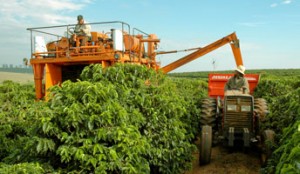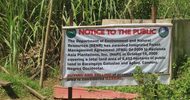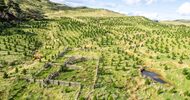By Ian Talley, Of DOW JONES NEWSWIRES
WASHINGTON -(Dow Jones)- An exponential increase in large-scale land purchases in developing countries offers significant economic opportunity but may be wreaking harm on vulnerable populations, the World Bank warned Tuesday.
Fueled by high food prices, international agriculture firms are seeking to capitalize on inexpensive land deals, buying up millions of hectares of arable land in Africa, Latin America, and Asia.
While such large-scale farmland deals can benefit populations in developing countries as more modern practices multiply production, many governments don't have safeguards in place to protect indigenous landowners or farmers.
The World Bank said countries need to establish new foreign-investment criteria that better recognize land rights, and governments should play a stronger role in developing land-acquisition policies. There's also a need for greater public disclosure on land deals, allowing broader access to information for watchdog organizations.
The World Bank believes radical productivity improvements on farms throughout developing countries are essential for cutting poverty and feeding undernourished populations.
"When done right, larger-scale farming systems can also have a place as one of many tools to promote sustainable agriculture and rural development, and can directly support smallholder productivity," it said.
But, the bank added, "the risks associated with such investments are immense." Recent large farmland purchases "have raised serious concerns about the danger of neglecting local rights" and are spurring questions over the long-term benefits to local populations and actual contributions to poverty-reduction, the bank said.
In many cases, local landowners weren't consulted about the sale of their properties, and if they were contacted, consultations "were superficial and did not result in written agreements."
Around 45 million hectares of farmland deals were announced by the end of 2009, far outstripping the average annual expansion of global agriculture land of 4 million hectares before 2008.
Only a fifth of the announced lands deals have since seen actual farming. In many of the land deals reviewed by the bank, there was often little--if any-- compensation for the loss of land rights, and a limited capacity to enforce environmental or social safeguards.
"These large land acquisitions can come at a high cost," said World Bank Managing Director Ngozi Okonjo-Iweala. "The veil of secrecy that often surrounds these land deals must be lifted so poor people don't ultimately pay the heavy price of losing their land," he said.
Bank officials said the organization is working with governments to put its recommended principles into practice. It's also urging development of an international agreement such as the Extractive Industries Transparency Initiative to encourage greater accountability in foreign agriculture investments. Under the EITI, companies and countries provide information on mining and petroleum deals as part of an effort to combat fraud.














